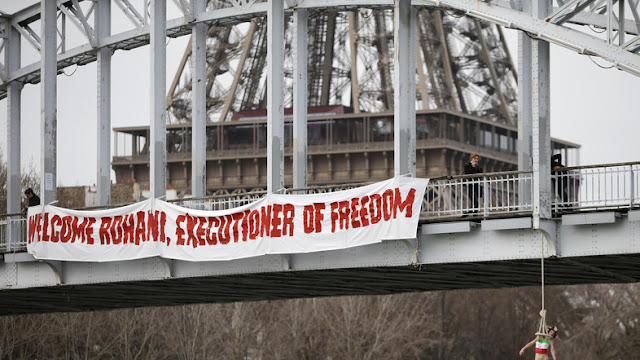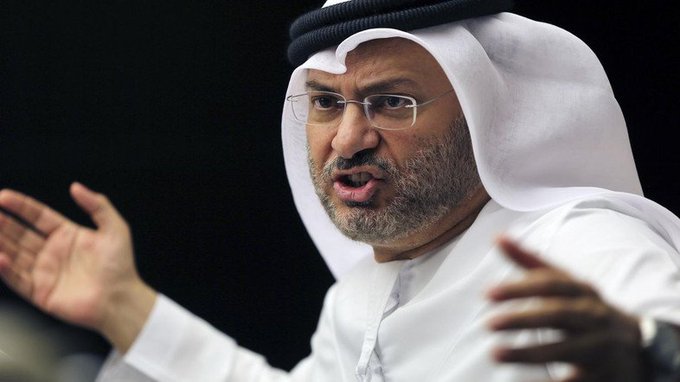By Heshmat Alavi
What we have all come to understand is the fact that protests across Iran came as a major shock for the ruling regime and the international community. While the first wave of protests may have been quelled, Iran's regime fully understands there is an intense fire burning in this powder keg society.
Making matters even worse, and a subject Tehran refuses to discuss, is the parallel expansion of international isolation currently haunting this regime. The Obama years are gone and the United States, Europe and the Arab World are adopting increasingly stronger positions against Iran's belligerent policies.
Iranian protesters are following these developments closely, knowing the stronger the international effort, the weaker the clerical rulers will be in quelling their demands for ultimate regime change.
Washington initiative
In response to U.S. President Donald Trump's 120-day ultimatum for Europe to improve the Iran nuclear deal, formally known as the Joint Comprehensive Plan of Action, U.S. Secretary of State Rex Tillerson paid a visit to his European counterparts to discuss Iran's ballistic missile program and regional meddling.
This cumulative pressure, with the Trump administration pushing forward this new Washington initiative to reform the JCPOA, is placing the Europeans before a decision they have been kicking down the road for decades, and especially during the eight years of Obama's full-throttle appeasement drive.
This rift in the West's actions provided Tehran the breathing room it desperately needed to export its dilemmas abroad, under the banner of "exporting the revolution." The end results in Iraq, Syria and Yemen go beyond any need of explanation after all these years of atrocities.
Europe changing face
During his London visit, Tillerson placed his finger on a subject considered highly sensitive for Iran. There is a growing consensus between the U.S., the UK, France and Germany over improvements necessary on various segments of the JCPOA and Iran's behavior in different areas continuously causing concerns for the international community.
Prior to this, signs have been growing of Europe changing face, as Paris and London very specifically made it known that Iran must take major steps back over its bellicosities. Without the
Obama administration providing life support for Tehran, the world has no ear for this regime's claims of pursuing a "defensive" ballistic missile program and meddling across the Middle East "to protect religious interests."
Despite the reality that European companies were seen initially rushing to Iran following the JCPOA signing, French Foreign Minister Jean-Yves Le Drian in his recent visit to Washington said their two countries are determined to even impose economic
sanctions on Iran in response to its ballistic missile development.
As similar remarks are heard from the U.K. and Germany, it is wise to conclude that these partners on both sides of the Atlantic are beginning to tighten the rope with meaningful measures against Tehran.
Arab World offensive
Another sign of the recent
Iran protests and international isolation hitting Iran where it hurts came as the regime's top diplomat, Mohammad Javad Zarif, cancelled his participation in the annual World Economic Forum at Davos.
For those familiar with the Iranian regime, this came as no surprise as Zarif knew harsh questions would be awaiting him regarding Tehran's quelling of recent protests. Such a scene was witnessed at the verbal beating Aladdin Borujderdi, head of Iran's parliamentary Security Commission, received during his recent European Parliament visit.
Gulf Arab officials used the World Economic Forum in Davos on Wednesday to slam Iran for its destabilizing behavior in the region.
Zarif's telling absence left the Davos platform ripe Saudi Arabia, the United Arab Emirates and Bahrain to launch a wave of harsh criticism at the Iranian regime.
"[Iran] is using sectarianism and terrorism in order to interfere in the affairs of other countries,” Saudi Foreign Minister Adel al-Jubeir told a panel at the forum.
UAE Minister of State for Foreign Affairs Anwar Gargash went on to accuse Iran’s influence in the region of “transnational sectarianism” nature, adding a wake-up call to Tehran by describing the recent protests across the country set “very significant” markers.
"The whole idea of not Gaza, not Syria but Iran is what you [Iran] should concentrate on, is a clear message, not from us across the Gulf, but from your own population. Don’t spend $5/6bn annually in Syria, don’t spend a billion on Hezbollah,” he added in reference to Iranian demonstrators protesting the regime's Middle East policy.
Different perspective
Despite this pressing emphasis on Iran's ballistic missile drive and regional meddling, Tehran seems to be seeing things differently.
"The JCPOA is facing fragile circumstances. Domestic disputes in this regard can be tantamount to an assist to the U.S.," according to the Bahar website, close to Iranian President Hassan Rouhani.
It is quite obvious that Washington's talks with Europe are not restricted to the JCPOA, but also covering the very issues Iran refuses to mention, cloaking its concerns behind a different perspective regarding recent developments.
It has become a known tactic of Iranian media and figures close to the ruling elite to launch a brouhaha about the JCPOA, while remaining silent on sensitive issues, such as their ballistic missiles and foot-sprints across the Middle East.
Why Iran needs to remain silent in this regard is quite obvious. At a time when people across the country are placing the very pillars of this regime in their crosshairs and demanding regime change, Tehran understands its weakening positions in the international spectrum will have a direct impact on domestic issues.
We must all come to understand conditions inside Iran and its relations with the outside world will never return to the status desired by the ruling regime and those international parties benefiting from these settings.
In such circumstances, each and every government across the globe has a duty to stand on the right side of history, being shoulder to shoulder with the Iranian people. This is no time to decrease any pressure on Iran's regime. Unlike the JCPOA, the setbacks foreseen for Iran's ballistic missile program and Middle East meddling must be sweeping and evocative.
If Iran avoids these two subjects, the international community must understand this is exactly where this regime will bleed significantly. Taking action in this regard will also send the correct message to Iran's protesters.
This
article was first published by al-Arabiya.





Comments
Post a Comment